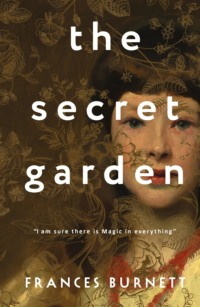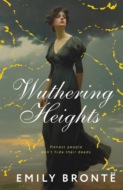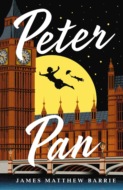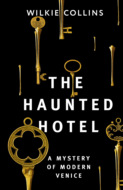Kitabı oku: «The Secret Garden», sayfa 2
Chapter III
Across the moor
She slept a long time, and when she awakened Mrs. Medlock had bought a lunchbasket at one of the stations and they had some chicken and cold beef and bread and butter and some hot tea. The rain seemed to be streaming down more heavily than ever and everybody in the station wore wet and glistening waterproofs. The guard lighted the lamps in the carriage, and Mrs. Medlock cheered up very much over her tea and chicken and beef. She ate a great deal and afterward fell asleep herself, and Mary sat and stared at her and watched her fine bonnet slip on one side until she herself fell asleep once more in the corner of the carriage, lulled by the splashing of the rain against the windows. It was quite dark when she awakened again. The train had stopped at a station and Mrs. Medlock was shaking her.
“You have had a sleep!” she said. “It’s time to open your eyes! We’re at Thwaite Station and we’ve got a long drive before us.”
Mary stood up and tried to keep her eyes open while Mrs. Medlock collected her parcels. The little girl did not offer to help her, because in India native servants always picked up or carried things and it seemed quite proper that other people should wait on one.
The station was a small one and nobody but themselves seemed to be getting out of the train. The station-master spoke to Mrs. Medlock in a rough, good-natured way, pronouncing his words in a queer broad fashion which Mary found out afterward was Yorkshire.
“I see tha’s got back,” he said. “An’ tha’s browt th’ young ’un with thee.”
“Aye, that’s her,” answered Mrs. Medlock, speaking with a Yorkshire accent herself and jerking her head over her shoulder toward Mary. “How’s thy Missus?”
“Well enow. Th’ carriage is waitin’ outside for thee.”
A brougham stood on the road before the little outside platform. Mary saw that it was a smart carriage and that it was a smart footman who helped her in. His long waterproof coat and the waterproof covering of his hat were shining and dripping with rain as everything was, the burly station-master included.
When he shut the door, mounted the box with the coachman, and they drove off, the little girl found herself seated in a comfortably cushioned corner, but she was not inclined to go to sleep again. She sat and looked out of the window, curious to see something of the road over which she was being driven to the queer place Mrs. Medlock had spoken of. She was not at all a timid child and she was not exactly frightened, but she felt that there was no knowing what might happen in a house with a hundred rooms nearly all shut up-a house standing on the edge of a moor.
“What is a moor?” she said suddenly to Mrs. Medlock.
“Look out of the window in about ten minutes and you’ll see,” the woman answered. “We’ve got to drive five miles across Missel Moor before we get to the Manor. You won’t see much because it’s a dark night, but you can see something.”
Mary asked no more questions but waited in the darkness of her corner, keeping her eyes on the window. The carriage lamps cast rays of light a little distance ahead of them and she caught glimpses of the things they passed. After they had left the station they had driven through a tiny village and she had seen whitewashed cottages and the lights of a public house. Then they had passed a church and a vicarage and a little shop-window or so in a cottage with toys and sweets and odd things set out for sale. Then they were on the highroad and she saw hedges and trees. After that there seemed nothing different for a long time-or at least it seemed a long time to her.
At last the horses began to go more slowly, as if they were climbing up-hill, and presently there seemed to be no more hedges and no more trees. She could see nothing, in fact, but a dense darkness on either side. She leaned forward and pressed her face against the window just as the carriage gave a big jolt.
“Eh! We’re on the moor now sure enough,” said Mrs. Medlock.
The carriage lamps shed a yellow light on a rough-looking road which seemed to be cut through bushes and low-growing things which ended in the great expanse of dark apparently spread out before and around them. A wind was rising and making a singular, wild, low, rushing sound.
“It’s-it’s not the sea, is it?” said Mary, looking round at her companion.
“No, not it,” answered Mrs. Medlock. “Nor it isn’t fields nor mountains, it’s just miles and miles and miles of wild land that nothing grows on but heather and gorse and broom, and nothing lives on but wild ponies and sheep.”
“I feel as if it might be the sea, if there were water on it,” said Mary. “It sounds like the sea just now.”
“That’s the wind blowing through the bushes,” Mrs. Medlock said. “It’s a wild, dreary enough place to my mind, though there’s plenty that likes it-particularly when the heather’s in bloom.”
On and on they drove through the darkness, and though the rain stopped, the wind rushed by and whistled and made strange sounds. The road went up and down, and several times the carriage passed over a little bridge beneath which water rushed very fast with a great deal of noise. Mary felt as if the drive would never come to an end and that the wide, bleak moor was a wide expanse of black ocean through which she was passing on a strip of dry land.
“I don’t like it,” she said to herself. “I don’t like it,” and she pinched her thin lips more tightly together.
The horses were climbing up a hilly piece of road when she first caught sight of a light. Mrs. Medlock saw it as soon as she did and drew a long sigh of relief.
“Eh, I am glad to see that bit o’ light twinkling,” she exclaimed. “It’s the light in the lodge window. We shall get a good cup of tea after a bit, at all events.”
It was “after a bit,” as she said, for when the carriage passed through the park gates there was still two miles of avenue to drive through and the trees (which nearly met overhead) made it seem as if they were driving through a long dark vault.
They drove out of the vault into a clear space and stopped before an immensely long but low-built house which seemed to ramble round a stone court. At first Mary thought that there were no lights at all in the windows, but as she got out of the carriage she saw that one room in a corner upstairs showed a dull glow.
The entrance door was a huge one made of massive, curiously shaped panels of oak studded with big iron nails and bound with great iron bars. It opened into an enormous hall, which was so dimly lighted that the faces in the portraits on the walls and the figures in the suits of armor made Mary feel that she did not want to look at them. As she stood on the stone floor she looked a very small, odd little black figure, and she felt as small and lost and odd as she looked.
A neat, thin old man stood near the manservant who opened the door for them.
“You are to take her to her room,” he said in a husky voice. “He doesn’t want to see her. He’s going to London in the morning.”
“Very well, Mr. Pitcher,” Mrs. Medlock answered. “So long as I know what’s expected of me, I can manage.”
“What’s expected of you, Mrs. Medlock,” Mr. Pitcher said, “is that you make sure that he’s not disturbed and that he doesn’t see what he doesn’t want to see.”
And then Mary Lennox was led up a broad staircase and down a long corridor and up a short flight of steps and through another corridor and another, until a door opened in a wall and she found herself in a room with a fire in it and a supper on a table.
Mrs. Medlock said unceremoniously:
“Well, here you are! This room and the next are where you’ll live-and you must keep to them. Don’t you forget that!”
It was in this way Mistress Mary arrived at Misselthwaite Manor and she had perhaps never felt quite so contrary in all her life.
Chapter IV
Martha
When she opened her eyes in the morning it was because a young housemaid had come into her room to light the fire and was kneeling on the hearth-rug raking out the cinders noisily. Mary lay and watched her for a few moments and then began to look about the room. She had never seen a room at all like it and thought it curious and gloomy. The walls were covered with tapestry with a forest scene embroidered on it. There were fantastically dressed people under the trees and in the distance there was a glimpse of the turrets of a castle. There were hunters and horses and dogs and ladies. Mary felt as if she were in the forest with them. Out of a deep window she could see a great climbing stretch of land which seemed to have no trees on it, and to look rather like an endless, dull, purplish sea.
“What is that?” she said, pointing out of the window.
Martha, the young housemaid, who had just risen to her feet, looked and pointed also.
“That there?” she said.
“Yes.”
“That’s th’ moor,” with a good-natured grin. “Does tha’ like it?”
“No,” answered Mary. “I hate it.”
“That’s because tha’rt not used to it,” Martha said, going back to her hearth. “Tha’ thinks it’s too big an’ bare now. But tha’ will like it.”
“Do you?” inquired Mary.
“Aye, that I do,” answered Martha, cheerfully polishing away at the grate. “I just love it. It’s none bare. It’s covered wi’ growin’ things as smells sweet. It’s fair lovely in spring an’ summer when th’ gorse an’ broom an’ heather’s in flower. It smells o’ honey an’ there’s such a lot o’ fresh air-an’ th’ sky looks so high an’ th’ bees an’ skylarks makes such a nice noise hummin’ an’ singin’. Eh! I wouldn’t live away from th’ moor for anythin’.”
Mary listened to her with a grave, puzzled expression. The native servants she had been used to in India were not in the least like this. They were obsequious and servile and did not presume to talk to their masters as if they were their equals. They made salaams and called them “protector of the poor” and names of that sort. Indian servants were commanded to do things, not asked. It was not the custom to say “please” and “thank you” and Mary had always slapped her Ayah in the face when she was angry. She wondered a little what this girl would do if one slapped her in the face. She was a round, rosy, good-natured looking creature, but she had a sturdy way which made Mistress Mary wonder if she might not even slap back-if the person who slapped her was only a little girl.
“You are a strange servant,” she said from her pillows, rather haughtily.
Martha sat up on her heels, with her blacking-brush in her hand, and laughed, without seeming the least out of temper.
“Eh! I know that,” she said. “If there was a grand Missus at Misselthwaite I should never have been even one of th’ under housemaids. I might have been let to be scullerymaid but I’d never have been let upstairs. I’m too common an’ I talk too much Yorkshire. But this is a funny house for all it’s so grand. Seems like there’s neither Master nor Mistress except Mr. Pitcher an’ Mrs. Medlock. Mr. Craven, he won’t be troubled about anythin’ when he’s here, an’ he’s nearly always away. Mrs. Medlock gave me th’ place out o’ kindness. She told me she could never have done it if Misselthwaite had been like other big houses.”
“Are you going to be my servant?” Mary asked, still in her imperious little Indian way.
Martha began to rub her grate again.
“I’m Mrs. Medlock’s servant,” she said stoutly. “An’ she’s Mr. Craven’s-but I’m to do the housemaid’s work up here an’ wait on you a bit. But you won’t need much waitin’ on.”
“Who is going to dress me?” demanded Mary.
Martha sat up on her heels again and stared. She spoke in broad Yorkshire in her amazement.
“Canna’ tha’ dress thysen!” she said.
“What do you mean? I don’t understand your language,” said Mary.
“Eh! I forgot,” Martha said. “Mrs. Medlock told me I’d have to be careful or you wouldn’t know what I was sayin’. I mean can’t you put on your own clothes?”
“No,” answered Mary, quite indignantly. “I never did in my life. My Ayah dressed me, of course.”
“Well,” said Martha, evidently not in the least aware that she was impudent, “it’s time tha’ should learn. Tha’ cannot begin younger. It’ll do thee good to wait on thysen a bit. My mother always said she couldn’t see why grand people’s children didn’t turn out fair fools-what with nurses an’ bein’ washed an’ dressed an’ took out to walk as if they was puppies!”
“It is different in India,” said Mistress Mary disdainfully. She could scarcely stand this.
But Martha was not at all crushed.
“Eh! I can see it’s different,” she answered almost sympathetically. “I dare say it’s because there’s such a lot o’ blacks there instead o’ respectable white people. When I heard you was comin’ from India I thought you was a black too.”
Mary sat up in bed furious.
“What!” she said. “What! You thought I was a native. You-you daughter of a pig!”
Martha stared and looked hot.
“Who are you callin’ names?” she said. “You needn’t be so vexed. That’s not th’ way for a young lady to talk. I’ve nothin’ against th’ blacks. When you read about ’em in tracts they’re always very religious. You always read as a black’s a man an’ a brother. I’ve never seen a black an’ I was fair pleased to think I was goin’ to see one close. When I come in to light your fire this mornin’ I crep’ up to your bed an’ pulled th’ cover back careful to look at you. An’ there you was,” disappointedly, “no more black than me-for all you’re so yeller.”
Mary did not even try to control her rage and humiliation.
“You thought I was a native! You dared! You don’t know anything about natives! They are not people-they’re servants who must salaam to you. You know nothing about India. You know nothing about anything!”
She was in such a rage and felt so helpless before the girl’s simple stare, and somehow she suddenly felt so horribly lonely and far away from everything she understood and which understood her, that she threw herself face downward on the pillows and burst into passionate sobbing. She sobbed so unrestrainedly that good-natured Yorkshire Martha was a little frightened and quite sorry for her. She went to the bed and bent over her.
“Eh! you mustn’t cry like that there!” she begged. “You mustn’t for sure. I didn’t know you’d be vexed. I don’t know anythin’ about anythin’-just like you said. I beg your pardon, Miss. Do stop cryin’.”
There was something comforting and really friendly in her queer Yorkshire speech and sturdy way which had a good effect on Mary. She gradually ceased crying and became quiet. Martha looked relieved.
“It’s time for thee to get up now,” she said. “Mrs. Medlock said I was to carry tha’ breakfast an’ tea an’ dinner into th’ room next to this. It’s been made into a nursery for thee. I’ll help thee on with thy clothes if tha’ll get out o’ bed. If th’ buttons are at th’ back tha’ cannot button them up tha’self.”
When Mary at last decided to get up, the clothes Martha took from the wardrobe were not the ones she had worn when she arrived the night before with Mrs. Medlock.
“Those are not mine,” she said. “Mine are black.”
She looked the thick white wool coat and dress over, and added with cool approval:
“Those are nicer than mine.”
“These are th’ ones tha’ must put on,” Martha answered. “Mr. Craven ordered Mrs. Medlock to get ’em in London. He said ‘I won’t have a child dressed in black wanderin’ about like a lost soul,’ he said. ‘It’d make the place sadder than it is. Put color on her.’ Mother she said she knew what he meant. Mother always knows what a body means. She doesn’t hold with black hersel’.”
“I hate black things,” said Mary.
The dressing process was one which taught them both something. Martha had “buttoned up” her little sisters and brothers but she had never seen a child who stood still and waited for another person to do things for her as if she had neither hands nor feet of her own.
“Why doesn’t tha’ put on tha’ own shoes?” she said when Mary quietly held out her foot.
“My Ayah did it,” answered Mary, staring. “It was the custom.”
She said that very often-“It was the custom.” The native servants were always saying it. If one told them to do a thing their ancestors had not done for a thousand years they gazed at one mildly and said, “It is not the custom” and one knew that was the end of the matter.
It had not been the custom that Mistress Mary should do anything but stand and allow herself to be dressed like a doll, but before she was ready for breakfast she began to suspect that her life at Misselthwaite Manor would end by teaching her a number of things quite new to her-things such as putting on her own shoes and stockings, and picking up things she let fall. If Martha had been a well-trained fine young lady’s maid she would have been more subservient and respectful and would have known that it was her business to brush hair, and button boots, and pick things up and lay them away. She was, however, only an untrained Yorkshire rustic who had been brought up in a moorland cottage with a swarm of little brothers and sisters who had never dreamed of doing anything but waiting on themselves and on the younger ones who were either babies in arms or just learning to totter about and tumble over things.
If Mary Lennox had been a child who was ready to be amused she would perhaps have laughed at Martha’s readiness to talk, but Mary only listened to her coldly and wondered at her freedom of manner. At first she was not at all interested, but gradually, as the girl rattled on in her good-tempered, homely way, Mary began to notice what she was saying.
“Eh! you should see ’em all,” she said. “There’s twelve of us an’ my father only gets sixteen shilling a week. I can tell you my mother’s put to it to get porridge for ’em all. They tumble about on th’ moor an’ play there all day an’ mother says th’ air of th’ moor fattens ’em. She says she believes they eat th’ grass same as th’ wild ponies do. Our Dickon, he’s twelve years old and he’s got a young pony he calls his own.”
“Where did he get it?” asked Mary.
“He found it on th’ moor with its mother when it was a little one an’ he began to make friends with it an’ give it bits o’ bread an’ pluck young grass for it. And it got to like him so it follows him about an’ it lets him get on its back. Dickon’s a kind lad an’ animals likes him.”
Mary had never possessed an animal pet of her own and had always thought she should like one. So she began to feel a slight interest in Dickon, and as she had never before been interested in anyone but herself, it was the dawning of a healthy sentiment. When she went into the room which had been made into a nursery for her, she found that it was rather like the one she had slept in. It was not a child’s room, but a grown-up person’s room, with gloomy old pictures on the walls and heavy old oak chairs. A table in the center was set with a good substantial breakfast. But she had always had a very small appetite, and she looked with something more than indifference at the first plate Martha set before her.
“I don’t want it,” she said.
“Tha’ doesn’t want thy porridge!” Martha exclaimed incredulously.
“No.”
“Tha’ doesn’t know how good it is. Put a bit o’ treacle on it or a bit o’ sugar.”
“I don’t want it,” repeated Mary.
“Eh!” said Martha. “I can’t abide to see good victuals go to waste. If our children was at this table they’d clean it bare in five minutes.”
“Why?” said Mary coldly.
“Why!” echoed Martha. “Because they scarce ever had their stomachs full in their lives. They’re as hungry as young hawks an’ foxes.”
“I don’t know what it is to be hungry,” said Mary, with the indifference of ignorance.
Martha looked indignant.
“Well, it would do thee good to try it. I can see that plain enough,” she said outspokenly. “I’ve no patience with folk as sits an’ just stares at good bread an’ meat. My word! don’t I wish Dickon and Phil an’ Jane an’ th’ rest of ’em had what’s here under their pinafores.”
“Why don’t you take it to them?” suggested Mary.
“It’s not mine,” answered Martha stoutly. “An’ this isn’t my day out. I get my day out once a month same as th’ rest. Then I go home an’ clean up for mother an’ give her a day’s rest.”
Mary drank some tea and ate a little toast and some marmalade.
“You wrap up warm an’ run out an’ play you,” said Martha. “It’ll do you good and give you some stomach for your meat.”
Mary went to the window. There were gardens and paths and big trees, but everything looked dull and wintry.
“Out? Why should I go out on a day like this?”
“Well, if tha’ doesn’t go out tha’lt have to stay in, an’ what has tha’ got to do?”
Mary glanced about her. There was nothing to do. When Mrs. Medlock had prepared the nursery she had not thought of amusement. Perhaps it would be better to go and see what the gardens were like.
“Who will go with me?” she inquired.
Martha stared.
“You’ll go by yourself,” she answered. “You’ll have to learn to play like other children does when they haven’t got sisters and brothers. Our Dickon goes off on th’ moor by himself an’ plays for hours. That’s how he made friends with th’ pony. He’s got sheep on th’ moor that knows him, an’ birds as comes an’ eats out of his hand. However little there is to eat, he always saves a bit o’ his bread to coax his pets.”
It was really this mention of Dickon which made Mary decide to go out, though she was not aware of it. There would be, birds outside though there would not be ponies or sheep. They would be different from the birds in India and it might amuse her to look at them.
Martha found her coat and hat for her and a pair of stout little boots and she showed her her way downstairs.
“If tha’ goes round that way tha’ll come to th’ gardens,” she said, pointing to a gate in a wall of shrubbery. “There’s lots o’ flowers in summer-time, but there’s nothin’ bloomin’ now.” She seemed to hesitate a second before she added, “One of th’ gardens is locked up. No one has been in it for ten years.”
“Why?” asked Mary in spite of herself. Here was another locked door added to the hundred in the strange house.
“Mr. Craven had it shut when his wife died so sudden. He won’t let no one go inside. It was her garden. He locked th’ door an’ dug a hole and buried th’ key. There’s Mrs. Medlock’s bell ringing-I must run.”
After she was gone Mary turned down the walk which led to the door in the shrubbery. She could not help thinking about the garden which no one had been into for ten years. She wondered what it would look like and whether there were any flowers still alive in it. When she had passed through the shrubbery gate she found herself in great gardens, with wide lawns and winding walks with clipped borders. There were trees, and flower-beds, and evergreens clipped into strange shapes, and a large pool with an old gray fountain in its midst. But the flower-beds were bare and wintry and the fountain was not playing. This was not the garden which was shut up. How could a garden be shut up? You could always walk into a garden.
She was just thinking this when she saw that, at the end of the path she was following, there seemed to be a long wall, with ivy growing over it. She was not familiar enough with England to know that she was coming upon the kitchen-gardens where the vegetables and fruit were growing. She went toward the wall and found that there was a green door in the ivy, and that it stood open. This was not the closed garden, evidently, and she could go into it.
She went through the door and found that it was a garden with walls all round it and that it was only one of several walled gardens which seemed to open into one another. She saw another open green door, revealing bushes and pathways between beds containing winter vegetables. Fruit-trees were trained flat against the wall, and over some of the beds there were glass frames. The place was bare and ugly enough, Mary thought, as she stood and stared about her. It might be nicer in summer when things were green, but there was nothing pretty about it now.
Presently an old man with a spade over his shoulder walked through the door leading from the second garden. He looked startled when he saw Mary, and then touched his cap. He had a surly old face, and did not seem at all pleased to see her-but then she was displeased with his garden and wore her “quite contrary” expression, and certainly did not seem at all pleased to see him.
“What is this place?” she asked.
“One o’ th’ kitchen-gardens,” he answered.
“What is that?” said Mary, pointing through the other green door.
“Another of ’em,” shortly. “There’s another on t’other side o’ th’ wall an’ there’s th’ orchard t’other side o’ that.”
“Can I go in them?” asked Mary.
“If tha’ likes. But there’s nowt to see.”
Mary made no response. She went down the path and through the second green door. There, she found more walls and winter vegetables and glass frames, but in the second wall there was another green door and it was not open. Perhaps it led into the garden which no one had seen for ten years. As she was not at all a timid child and always did what she wanted to do, Mary went to the green door and turned the handle. She hoped the door would not open because she wanted to be sure she had found the mysterious garden-but it did open quite easily and she walked through it and found herself in an orchard. There were walls all round it also and trees trained against them, and there were bare fruit-trees growing in the winter-browned grass-but there was no green door to be seen anywhere. Mary looked for it, and yet when she had entered the upper end of the garden she had noticed that the wall did not seem to end with the orchard but to extend beyond it as if it enclosed a place at the other side. She could see the tops of trees above the wall, and when she stood still she saw a bird with a bright red breast sitting on the topmost branch of one of them, and suddenly he burst into his winter song-almost as if he had caught sight of her and was calling to her.
She stopped and listened to him and somehow his cheerful, friendly little whistle gave her a pleased feeling-even a disagreeable little girl may be lonely, and the big closed house and big bare moor and big bare gardens had made this one feel as if there was no one left in the world but herself. If she had been an affectionate child, who had been used to being loved, she would have broken her heart, but even though she was “Mistress Mary Quite Contrary” she was desolate, and the bright-breasted little bird brought a look into her sour little face which was almost a smile. She listened to him until he flew away. He was not like an Indian bird and she liked him and wondered if she should ever see him again. Perhaps he lived in the mysterious garden and knew all about it.
Perhaps it was because she had nothing whatever to do that she thought so much of the deserted garden. She was curious about it and wanted to see what it was like. Why had Mr. Archibald Craven buried the key? If he had liked his wife so much why did he hate her garden? She wondered if she should ever see him, but she knew that if she did she should not like him, and he would not like her, and that she should only stand and stare at him and say nothing, though she should be wanting dreadfully to ask him why he had done such a queer thing.
“People never like me and I never like people,” she thought. “And I never can talk as the Crawford children could. They were always talking and laughing and making noises.”
She thought of the robin and of the way he seemed to sing his song at her, and as she remembered the tree-top he perched on she stopped rather suddenly on the path.
“I believe that tree was in the secret garden-I feel sure it was,” she said. “There was a wall round the place and there was no door.”
She walked back into the first kitchen-garden she had entered and found the old man digging there. She went and stood beside him and watched him a few moments in her cold little way. He took no notice of her and so at last she spoke to him.
“I have been into the other gardens,” she said.
“There was nothin’ to prevent thee,” he answered crustily.
“I went into the orchard.”
“There was no dog at th’ door to bite thee,” he answered.
“There was no door there into the other garden,” said Mary.
“What garden?” he said in a rough voice, stopping his digging for a moment.
“The one on the other side of the wall,” answered Mistress Mary. “There are trees there-I saw the tops of them. A bird with a red breast was sitting on one of them and he sang.”
To her surprise the surly old weather-beaten face actually changed its expression. A slow smile spread over it and the gardener looked quite different. It made her think that it was curious how much nicer a person looked when he smiled. She had not thought of it before.
He turned about to the orchard side of his garden and began to whistle-a low soft whistle. She could not understand how such a surly man could make such a coaxing sound.
Almost the next moment a wonderful thing happened. She heard a soft little rushing flight through the air-and it was the bird with the red breast flying to them, and he actually alighted on the big clod of earth quite near to the gardener’s foot.
“Here he is,” chuckled the old man, and then he spoke to the bird as if he were speaking to a child.
“Where has tha’ been, tha’ cheeky little beggar?” he said. “I’ve not seen thee before today. Has tha begun tha’ courtin’ this early in th’ season? Tha’rt too forrad.”
The bird put his tiny head on one side and looked up at him with his soft bright eye which was like a black dewdrop. He seemed quite familiar and not the least afraid. He hopped about and pecked the earth briskly, looking for seeds and insects. It actually gave Mary a queer feeling in her heart, because he was so pretty and cheerful and seemed so like a person. He had a tiny plump body and a delicate beak, and slender delicate legs.
“Will he always come when you call him?” she asked almost in a whisper.
“Aye, that he will. I’ve knowed him ever since he was a fledgling. He come out of th’ nest in th’ other garden an’ when first he flew over th’ wall he was too weak to fly back for a few days an’ we got friendly. When he went over th’ wall again th’ rest of th’ brood was gone an’ he was lonely an’ he come back to me.”








